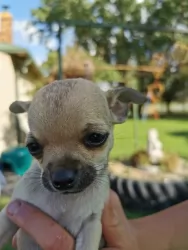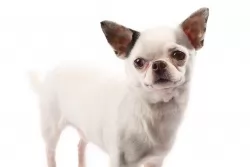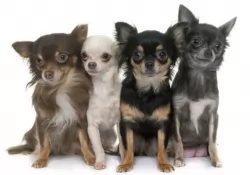 MyDogBreeds
MyDogBreeds Portuguese Pointer is originated from Portugal but Chihuahua is originated from Mexico. Portuguese Pointer may grow 37 cm / 15 inches higher than Chihuahua. Portuguese Pointer may weigh 23 kg / 51 pounds more than Chihuahua. Portuguese Pointer may live 6 years less than Chihuahua. Portuguese Pointer may have more litter size than Chihuahua. Both Portuguese Pointer and Chihuahua requires Low maintenance.
Portuguese Pointer is originated from Portugal but Chihuahua is originated from Mexico. Portuguese Pointer may grow 37 cm / 15 inches higher than Chihuahua. Portuguese Pointer may weigh 23 kg / 51 pounds more than Chihuahua. Portuguese Pointer may live 6 years less than Chihuahua. Portuguese Pointer may have more litter size than Chihuahua. Both Portuguese Pointer and Chihuahua requires Low maintenance.
 The Portuguese Pointer comes from Portugal where the dog was developed as a gun dog. It is believed that the dog is descended from the Spanish Pointer and developed to point out game.
The Portuguese Pointer comes from Portugal where the dog was developed as a gun dog. It is believed that the dog is descended from the Spanish Pointer and developed to point out game.
The dog was was recognized by the United Kennel Club in 1996.
The dog was introduced to England in the 18th century and the modern type of the Portuguese Pointer became established in the early 1900’s when the breed had become endangered. A group of breeders re-established its numbers.
Today it is both working- and companion dog. The UK Kennel Club recognised it as a breed in 2014.
 Quite a bit of the Chihuahua’s history is shrouded in mystery, and there are different versions about its origins.
Quite a bit of the Chihuahua’s history is shrouded in mystery, and there are different versions about its origins.
While historians speculate, most will agree that the tiny dog hails from Mexico. The UK Kennel Club considers the smooth- and long coat Chihuahuas as 2 distinct breeds.It was in 1904 that the Chihuahua became a registered breed by the American Kennel Club.
Chihuahua is actually the name of a state in Mexico, and it is amazing that Chihuahua specimens were found way back in the 1800's already. Today the Chihuahua is a very popular dog breed in several countries.
 Originating from Portugal, the attractive, almost Boxer-like looking dog is a medium sized purebred dog that stands at between 48 and 60cm in height and weighs roughly 16 to 27kg.
Originating from Portugal, the attractive, almost Boxer-like looking dog is a medium sized purebred dog that stands at between 48 and 60cm in height and weighs roughly 16 to 27kg.
The Portuguese Pointer has a coat that is light brown, tan or yellow. The dog has a short, easy to maintain coat. He has a fairly square face, much like the Boxer, floppy ears with a long tail. The tail is usually docked. The eyes are brown and he a bright, alert, kind expression.
The Portuguese Pointer is a dog with strong hunting instincts, but who still has time to make a splendid companion for his human family. He is gentle and loyal to his human family, being somewhat reserved with strangers. This is a good thing really as this makes him a good watchdog.
He is good with other pets in the home as well as with children. He badly wants to please his family, and because he is intelligent and a fast learner, you won’t have any trouble with training and socialization.
He is a sociable dog, loving to be close to its owner. He is active and will require quite a bit of exercise, loving to join in with games with the children. He gets on well with children in the home as well as with animals.
 The small Chihuahua stands at about 15 – 23 cm and he weighs about 1,5 – 4kg.
The small Chihuahua stands at about 15 – 23 cm and he weighs about 1,5 – 4kg.
You’ll notice that he shivers when he is excited or when he is cold or frightened. Some people buy him a jersey to don on cooler days. With this tiny toy dog, you get a short- and a long coated Chihuahua.
This is the smallest dog breed and his coat is available in a number of colors such as fawn, tan, white and black. It is the dog’s round apple-shaped head which is a distinctive feature. He has erect ears and huge fruit-bat type eyes.
The Chihuahua is such an alert, fun-loving, feisty little dog, and though he may appear to be an ideal pet for children, he actually isn’t. He is too dainty and frail, and a child, during play, could accidentally crush him.
It’s a pity though because he just loves being around his human family. He is also a highly strung dog, and given the chance, he’ll nip and even bite during games. It is why socialization and training are considered important for the Chihuahua.
Just like with children, how you raise and treat your Chihuahua will determine how he turns out. He is such a sweet little dog that training and socialization can remove these unwanted characteristics. He is very intelligent and responds well to training.
 The gorgeous Portuguese Pointer makes such a loyal and loving pet. He is always looking out for his human family, making sure that they are safe and protected under his watch.
The gorgeous Portuguese Pointer makes such a loyal and loving pet. He is always looking out for his human family, making sure that they are safe and protected under his watch.
He is an excellent watch dog too, proudly running around outside and making sure that there are no intruders around. They are good with kids too if the kids are gentle and kind with animals.
He loves a good game too and is always ready to take part in any activities you’re taking part in. The Portuguese Pointer is truly an awesome pet and companion.
 Small and feisty, the Chihuahua’s personality isn’t set in stone, and the tiny dog can be either shy and timid or he can be social, confident and jaunty.
Small and feisty, the Chihuahua’s personality isn’t set in stone, and the tiny dog can be either shy and timid or he can be social, confident and jaunty.
They're always loyal and affectionate to their human owners, but they don’t get on too well with- and are wary of small children who aren’t disciplined and who could hurt them.
With his big eyes and big ears together with his comical antics, they can be a source of entertainment for their human owners. He is easy to train too and even though he is small, he doesn’t think he is, and he is willing to use his big personality to make you a loving, loyal and devoted companion.
 Your robust Portuguese Pointer isn’t known to be a dog to suffer with too many breed related health problems. With good care he can reach 14 years of age.Portuguese Pointers are a healthy breed, but some health issues can crop up -
Your robust Portuguese Pointer isn’t known to be a dog to suffer with too many breed related health problems. With good care he can reach 14 years of age.Portuguese Pointers are a healthy breed, but some health issues can crop up -
Cancer is a leading cause of death in dogs young and old. Luckily, if caught early, cancer is curable. Some of the cancers found in dogs are malignant lymphoma – a tumor of the lymph nodes.
Skin cancer is also fairly common. The warning signs of cancer in dogs can be a new lump or a wound that won’t heal. While these are classic signs, sometimes there are no signs. If your dog isn’t feeling well, it’s time to get him to the veterinarian.
The liver is one of the vital body organs but it is susceptible to a wide variety of problems. It detoxifies the blood, stores vitamins and assists with digestion among other things.
One of the most common symptoms of liver disease is jaundice. When the liver isn’t functioning properly, bilirubin builds up in the blood and leads to the yellowish appearance of the dog.
Other common symptoms of liver disease include vomiting, weight loss and diarrhea. Veterinary attention will be required.
 The Chihuahua doesn't have any particular health issues, more so when you get him from a reputable breeder. With good care he can reach 20 years of age.
The Chihuahua doesn't have any particular health issues, more so when you get him from a reputable breeder. With good care he can reach 20 years of age.
Known as low blood sugar, hypoglycemia is easily treatable, but if it isn’t caught early it can be fatal.Hypoglycemia makes a dog lethargic and he’ll shiver and could go into a coma. Get him to the vet immediately.
Gastric Dilatation or bloat is when the stomach twists, it becomes enlarged and blood supply is cut off to the stomach. Left untreated, it can be fatal.
Chihuahuas are susceptible to dental problems, so you will need to brush his teeth 2 or 3 times a week to prevent tartar build-up, gum disease, loss of teeth and other diseases.
 The Portuguese Pointer has been a working dog and doesn’t enjoy lying around with nothing to do. Apart from a walk every day which he loves, he’ll want other activities that stimulate him mentally and physically.
The Portuguese Pointer has been a working dog and doesn’t enjoy lying around with nothing to do. Apart from a walk every day which he loves, he’ll want other activities that stimulate him mentally and physically.
His short coat means that he won’t require any special grooming. He does shed constantly, like many other dogs, and a good brush twice a week will keep his short coat vibrant and shiny.
Your canine friend will require protein in his diet as well as all the vitamins ad minerals for health. The very best commercially manufactured dog foods will be required for his health.
The dry kibble can be a wonderful convenient way to feed your pet. The best commercial foods meet the requirements for a dog’s diet. Give him some delicious home made food too. Boiled chicken, brown rice, sweet potatoes, carrots and spinach can be cooked in bulk and then chopped up and small portions mixed into the dry kibble twice a week as a treat.
It provides your pet with an alternative to the dry kibble, it is healthy, easy to digest and your pet will love it. Dogs thrive on simple consistency. Once in a while you can also give him some raw meat. Never leave him without a constant supply of fresh, cool water.
 Always make sure to choose a high-quality dog food for your Chihuahua as this will keep him in tip-top health. A healthy Chihuahua can live to be 20 years of age. Speak to a veterinarian for recommendations on the best type of food to feed your tiny pet.
Always make sure to choose a high-quality dog food for your Chihuahua as this will keep him in tip-top health. A healthy Chihuahua can live to be 20 years of age. Speak to a veterinarian for recommendations on the best type of food to feed your tiny pet.
Giving him some home-made food such as brown rice, vegetables and cooked chicken for instance will be a welcome treat for him. Make sure he always has a bowl of fresh, cool water close by.
The Chihuahua may well be the smallest toy sized dog breed, but don’t be mistaken – he has plenty of energy and is constantly prancing around. He is more than capable of living in a small apartment, but even so he needs to be taken outside every now and then for a game or a walk.
Be careful with your small pet though, as too much exercise can lead to elbow- and hip dysplasia.
The Chihuahua is a moderate shedder with Spring being their heavier shedding period. Because of his small size, you won’t be bothered by too much hair. The short haired Chihuahua is easy to maintain and with a rubber brush, you can brush him gently twice a week.
You’ll also need to clip his nails and if you can’t manage this your vet can also help you.